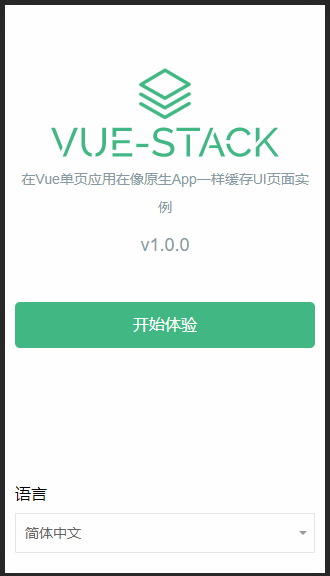English | 简体中文
A Vue SPA navigation manager,cache the UI in the SPA like a native application, rather than destroy it.
- 🐉expanded on vue-router, the original navigation logic remains unchanged
- ⚽When a page is re-rendered as a
pushorforward, the newly rendered page will be added to the Stack. - 🏆When
backorgo(negative number), the previous pages are not re-rendered, but instead are read from the Stack, and these pages retain the previous content state, such as the form content, the position of the scroll bar - 🏈
backorgo (negative)will remove unused pages from the Stack - 🎓
replacewill update the current page in the stack - 🎉activated hook function triggers when rolling back to the previous page
- 🚀Browser back and forward events are supporded
- 🍕Responding to changes in routes with Parameters is supporded, such as navigating from
/user/footo/user/bar, component instances are reused - 🐰provides routing direction changes, and you can add different animations when forward or backward
npm install vue-page-stack
# OR
yarn add vue-page-stack
import Vue from 'vue'
import VuePageStack from 'vue-page-stack';
// vue-router is necessary
Vue.use(VuePageStack, { router });
// App.vue
<template>
<div id="app">
<vue-page-stack>
<router-view ></router-view>
</vue-page-stack>
</div>
</template>
<script src="https://unpkg.com/vue-page-stack/dist/vue-page-stack.js"></script>
Vue.use(VuePageStack.default, { router });
use Vue.use to install vue-page-stack
Vue.use(VuePageStack, options);
// example
Vue.use(VuePageStack, { router });
Options description:
| Attribute | Description | Type | Accepted Values | Default |
|---|---|---|---|---|
| router | vue-router instance | Object | vue-router instance | - |
| name | VuePageStack name | String | 'VuePageStack' | 'VuePageStack' |
| keyName | stack-key name | String | 'stack-key' | 'stack-key' |
you can customize VuePageStack's name and keyName
Vue.use(VuePageStack, { router, name: 'VuePageStack', keyName: 'stack-key' });
If you want to make some animate entering or leaving, vue-page-stack offers stack-key-dir to judge forward or backward.
// App.vue
$route(to, from) {
if (to.params['stack-key-dir'] === 'forward') {
this.transitionName = 'forward';
} else {
this.transitionName = 'back';
}
}
let UIStack = this.$pageStack.getStack();
Why is the parameter keyName added to the route? To support the browser's backward and forward events,this is important in webApp or wechat.
Getting the current page instance refers to the keep-alive section of Vue.
The plug-in draws on both vue-navigation and vue-nav,Thank you very much for their inspiration.
